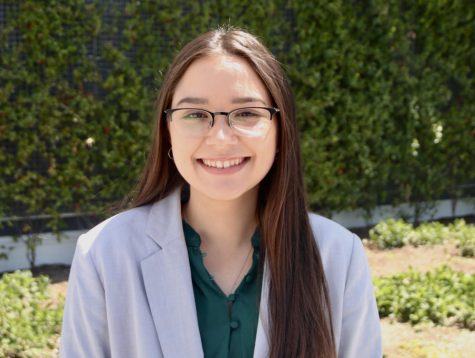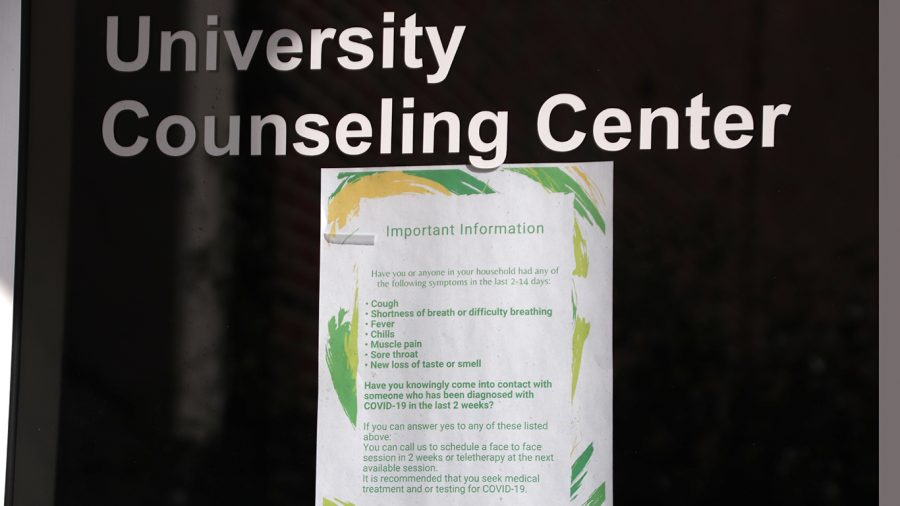Counselors speak on the components of telemental health counseling
Prakriti Adhikari/The Lion’s Roar
The University Counseling Center has been providing telemental health counseling since the start of the pandemic. Counselors were trained specifically in telemental health to start the virtual service.
The University Counseling Center has been providing virtual services, known as telemental health counseling, to clients over the past few months.
Counselors and clients alike have had to adapt to the online counseling environment. For counselors, that meant undergoing extra training and adjusting client approaches to ensure the highest quality of mental health care for students, faculty and staff.
While all UCC counselors are licensed for in-person counseling, a special credential is normally needed to be authorized for telemental health counseling. Courtney Williams, counselor and Assistant Director of Crisis at the UCC, explained how the pandemic has affected these regulations.
“During the pandemic, all of the rules have actually been rescinded right now, so any counselor who is licensed is able to practice teletherapy since we’re in a state of emergency,” said Williams. “However, regularly, counselors have to get extra training specifically in telemental health, and we applied to our licensing board for a special designation of conducting telemental health.”
Williams described the training and other elements of the process the UCC had to go through in order to ensure credibility.
“We did a training that was offered to us,” said Williams. “It was a nine-hour training. We did that, and then—we have a licensing board that regulates our licenses in general—we contacted them to apply for that designation. We’re all in that process right now of receiving that designation that way we have it in case the state of emergency is lifted.”
While both types of sessions are conducted similarly, an important difference between teletherapy and in-person counseling is that the counselor must verify the location of the client in case an emergency arises. All clients also need to fill out initial intake paperwork for telemental health counseling even if the client has previously utilized on-campus UCC services.
Annette Newton-Baldwin, counselor and Assistant Director of Programming and Outreach at the UCC, explained that the UCC uses Zoom to conduct online support group sessions, another virtual mental health service provided for Lions.
“We were able to purchase Zoom, so we’re under a contract with Zoom for at least a year,” stated Newton-Baldwin. “When you do support groups with Zoom, you can see everybody at the same time, which is pretty cool. All of our support groups are being run virtually, and in the fall, we will absolutely still have virtual support groups.”
Amanda Anderson, counselor at the UCC, noted that a predominant benefit of telemental health counseling is increased accessibility due to technology.
“It’s something that you can easily have on your computer or even on your phone,” said Anderson. “Really, you can have a counselor in your back pocket. We’re able to reach populations that we weren’t able to reach before maybe because of mental health issues or transportation issues.”
While there are many benefits, such as easier accessibility and scheduling, there are also disadvantages that come with conducting a mental health session virtually.
“With teletherapy, I find myself checking in even more and making sure that my clients feel safe and they feel connected since we’re missing out on the in-person,” said Anderson. “There’s a lot of benefits of just sitting in a room and having undivided attention. So, I try to transfer that to teletherapy as much as possible.”
The UCC has seen telemental health counseling as a chance to continue virtual services in case of situations in which the client cannot get to campus for an appointment, as well as for COVID-19 precautions.
“For now, in the fall, we’re definitely thinking about implementing it in some way because even though the plans are to come back fully in-person, we understand that some students might have a relative who is at more risk of developing COVID, and we want to respect them and still allow them to receive their services,” explained Williams.
Anyone interested in telemental health counseling can contact the UCC at 985-549-3894 Monday through Thursday from 8 a.m. – 5 p.m. or email SLUCC@southeastern.edu to schedule an appointment or for more information.
Your donation will support The Lion's Roar student journalists at Southeastern Louisiana University.
In addition, your contribution will allow us to cover our annual website hosting costs.
No gift is too small.

Brynn Lundy Arriago began working for The Lion's Roar in the fall of 2019, her first semester at Southeastern, and now serves as Graduate Assistant. From...







